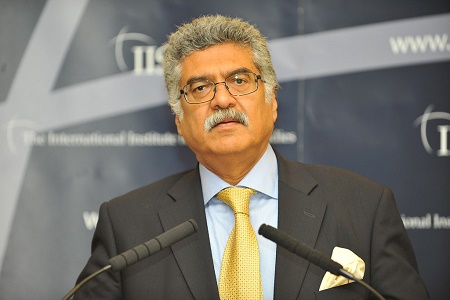Pakistan needs credible second-strike capability for stable deterrence: Ambassador Zamir Akram

Islamabad: Former ambassador to the United Nations and Conference on Disarmament Zamir Akram has reiterated the need for developing a credible second-strike capability for stable deterrence.
He was speaking at a webinar hosted by the Strategic Vision Institute (SVI) ‘India’s Counterforce Temptations’, the institute said in a press release on Thursday.
It should be recalled that the statements by Indian leaders and development of nuclear capabilities point to a possible strategy of a preemptive strike against Pakistan’s nuclear forces in the eventuality of a crisis.
Besides, the sea-based second-strike capability, Amb Akram said Pakistan needed longer-range missiles and Anti-satellite weapons (ASAT) capability to counter India’s counter force temptations.
The expert also called for enhancing the capability to penetrate India’s ballistic missile defense system. He noted the progress made in that regard by Pakistan through the development of cruise missiles and Multiple Independently targetable Re-entry Vehicles (MIRVs).
Dr. Adil Sultan, acting dean at Air University’s Faculty of Aerospace Sciences and Strategic Studies, said that India was enhancing its second-strike capability through the development of hypersonic weapons.
He said that hypersonic weapons were considered to be more effective against short-range ballistic missiles such as Nasr. India’s intentions, he asserted, were to use hypersonic weapon as a deterrent against Pakistan by implementing its Cold Start Doctrine.
Dr Rizwana Abbassi, head of international relations department at National University of Modern Languages, said that India believes to be enjoying an edge over Pakistan because of the new technologies that it has acquired or developed.
Indian temptations, she said, though hard to materialize at a practical level were undermining the broader strategic stability and were thereby increasing nuclear risk and generating a new sort of arms race in South Asia.
Both South Asian rivals, Dr Abbassi argued, will have to turn to dialogue in one way or another; promote risk reduction, avoid an intense arms race, exercise restraint, and adopt confidence-building measures. She said that this course was the only way forward.
President SVI Dr. Zafar Iqbal Cheema, while inaugurating the session, noted with concern that India was drifting away from its stated Draft Nuclear Doctrine of 1999, and was deliberately creating ambiguity about it. He insisted Pakistan was particularly concerned about the shifts in India’s nuclear doctrine, because it was principally affected by India’s nuclear posture.





